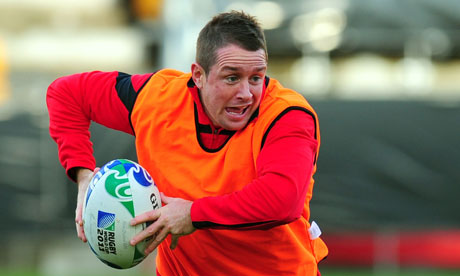
Choosing the right moment has never been a problem for Shane Williams. He hovered behind Jonathan Davies and picked up the scraps to score the try against Samoa that helped to steer Wales safely out of their pool. He was on hand against Ireland to finish the early move that set Wales on their way to the semi‑final. His tries for Wales, all 56 of them, tell of a wing who knows exactly where to be at just the right time.
But he is struggling with time and space right now. "I'm not stringing you along," he says at the announcement of the Wales team to face Australia in the bronze final on Friday. "I know it's coming … but, I don't know, I get depressed thinking about it, to be honest."
He is talking about retirement. At the age of 34 and with 85 caps to his name, there is not a lot of time left. One game and that may be it, a farewell to be said at the World Cup, that has been the greatest adventure of his life. Better than the grand slams of 2005 and 2008? "They were enormous. But this World Cup has been something else. This group worked so hard in the weeks before coming here that it has become a time like no other over here. Especially since nobody really gave us a chance. To have been accepted – adopted – by so many people in New Zealand has been fantastic."
Or Friday may not be his last game. Because he is Shane Williams a little romance has crept into the equation. Wales are playing a thoroughly unromantic game against Australia on 3 December, one of those financial hole-fillers that may be tricky to sell, a month and a bit after the World Cup. A chance to say goodbye on home turf might sell a ticket or three.
"The offer has been made, to play against Australia at the Millennium Stadium, but I don't know. I can't think beyond Friday. It's too depressing to think of retirement."
Depression, you may have noticed, has crept in. It is not too alarming since there is his contract with the Ospreys to keep him going until the end of the season. We may be saying farewell to Shane for a few months yet. But this is the beginning of the end for a wonderful rugby player. "It's been a good trip and a good story along the way. It's sad that Friday will be my last World Cup game."
Warren Gatland, a hooker from Waikato, for goodness' sake, is caught up in the sentimentality of all this. "He's been an absolute superstar, one of the most exciting players in the northern hemisphere of all time. We'd like him to stay for maybe a bit longer but it's up to him to decide about that game in Cardiff against Australia."
The coach and his wing can afford to be a little mawkish about the whole business. Gatland's hard head will be put back on for the 2012 Six Nations. "Shane's getting a bit old. That's the reality. We've got to start thinking of the next four years. We've not got the biggest player base, so we've got to start looking in the next Six Nations. There may be a few tough calls to be made."
Does that mean Williams is going before he is shoved? "Is that going to be the headline?" asks the coach with a smile. "No, he'll make the decision himself. He deserves that."
Williams recognises this natural cycle, the emergence of George North and the establishment of Leigh Halfpenny as a major contributor to the Welsh cause. Before the World Cup S Williams was responsible for more than a quarter of the 73 tries scored in the 43 games under Gatland. Now there are children bursting through. "They've got cheekier and cheekier as the tournament has gone on," he says. "I get depressed looking at their dates of birth."
More depression. There is no need for it has been more than a good story. It is a fabulous tale. From the moment he began to electrify the crowd at The Gnoll, having come down to Neath from Amman United as a part-time scrum‑half, he has illuminated the game. Lyn Jones, coach at the club and soon to become coach of the Ospreys region, put him on the wing and soon he was pressing for a place in the Wales team.
But how tender and frail he looked in 2000. This was the age when Graham Henry and then Steve Hansen were in charge of the team and there was no sentiment back then. Bulk up or bail out. It is amazing to think that Shane went to the World Cup in 2003 merely as a third-choice scrum‑half.
Wales were beaten by England in the quarter‑final in Australia but against the eventual winners and against New Zealand in the pool he played with an invention and industry that confirmed on the bigger stage what Wales already knew: this was our special one.
And he has remained so for eight years, prone to injury perhaps but growing in muscle season on season; still short but rarely exposed. He learned not to surrender the ball in contact and became a black-belt tackler, expert at bringing larger foes down. But even had he refused to put himself in harm's way – which he never did – he would still have been brilliant because when Shane Williams had the ball we held our breath.
Perhaps the legs do not deliver the speed of old; perhaps the gaps do not miraculously appear before him as they once did. But prepare to suck in one last deep lungful because our Shane is leaving town and this is going to be one long emotional goodbye.

